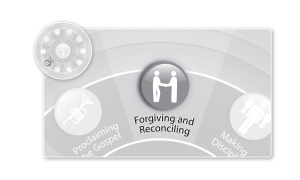 Scripture reminds us on nearly every page that it is simply not possible to work from human ways of thinking about forgiveness to God’s way of thinking about forgiveness. The two differ not in degree but in kind. In order to understand God’s way of thinking about forgiveness, we have to do something other than try to be more forgiving. We have to give up completely our human ways of thinking about forgiveness.
Scripture reminds us on nearly every page that it is simply not possible to work from human ways of thinking about forgiveness to God’s way of thinking about forgiveness. The two differ not in degree but in kind. In order to understand God’s way of thinking about forgiveness, we have to do something other than try to be more forgiving. We have to give up completely our human ways of thinking about forgiveness.
That’s what the Lord says in Isaiah 55:7–9:
Let the wicked forsake his way
and the evil man his thoughts.
Let him turn to the LORD, and he will have mercy on him,
and to our God, for he will freely pardon.
For my thoughts are not your thoughts,
neither are your ways my ways,
declares the LORD.
As the heavens are higher than the earth,
so are my ways higher than your ways
and my thoughts than your thoughts.
This is a theme that comes up again and again in Scripture: Human beings struggle to understand God’s forgiveness, not just because they are unforgiving but also because human ways of forgiveness keep getting in the way.
Many Christians think, quite humanly, that forgiveness is a feeling. They have forgiving feelings in their best moments, so they think that God must be calling them to have more of these forgiving moments—more lovely feelings in their hearts toward those who have hurt them. But that concept is not in the Scripture.
Other Christians think that forgiveness means forgetting. They think that God is calling them to edit their memories and, instead of addressing the hurts they’ve received, erase those hurts like Watergate tapes. They sometimes get this idea when they hear that God “remembers our sins no more.” But as we talked about in Part II of our series, when Scripture says God remembers our sins no more, it doesn’t mean that he forgets them. It means that he has dealt with them so completely in the cross that it is not necessary for him to devise another way of dealing with them in the future. So forgetting is not forgiveness.
Still other Christians gird up their loins and resolve to undertake forgiveness as a decision—an act of their own willpower. They think that God is calling them to overcome the hurts they have received by using their willpower to rebuild relationships with people who have wronged them. But this can’t be God’s way, because God more than anybody knows how weak the human will is, and how damaged it is by sin.
So if not as feeling, forgetting, or an act of will, then what is it? How does Scripture portray forgiveness?
We’ll unearth that answer as we dig into the original languages of the Scripture in Part VII of our series on forgiving and reconciling.











Pingback: Which Comes First – Forgiveness or Repentance? | Rev. Eric Foley